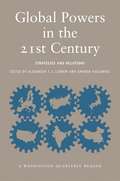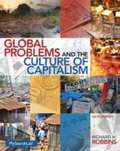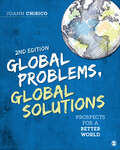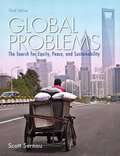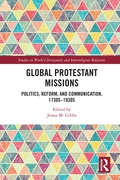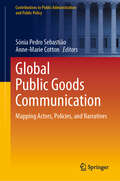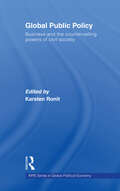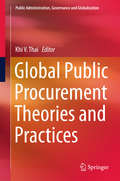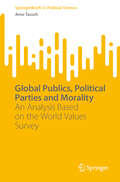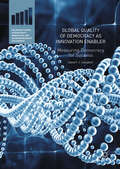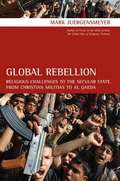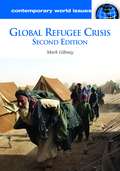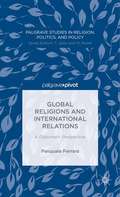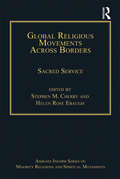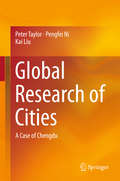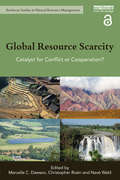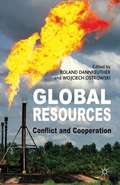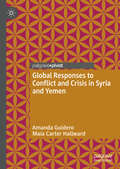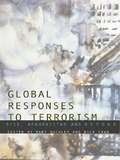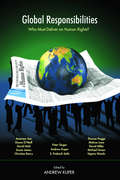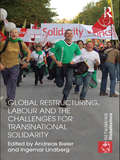- Table View
- List View
Global Powers in the 21st Century: Strategies and Relations
by Alexander T. J. Lennon Amanda KozlowskiAlthough the United States is considered the world's only superpower, other major powers seek to strengthen the roles they play on the global stage. Because of the Iraq War and its repercussions, many countries have placed an increased emphasis on multilateralism. This new desire for a multipolar world, however, may obscure the obvious question of what objectives other powerful countries seek. Few scholars and policymakers have addressed the role of the other major powers in a post-9/11 world. Global Powers in the 21st Century fills this gap, offering in-depth analysis of China, Japan, Russia, India, and the European Union in this new global context. Prominent analysts, including Zbigniew Brzezinski, C. Raja Mohan, David Shambaugh, Dmitri Trenin, Akio Watanabe, and Wu Xinbo, examine the policies and positions of these global players from both international and domestic perspectives. The book discusses each power's domestic politics, sources of power, post-9/11 changes, relationship with the United States, adjustments to globalization, and vision of its place in the world. Global Powers in the 21st Century offers readers a clear look at the handful of actors that will shape the world in the years ahead.
Global Powers of Horror: Security, Politics, and the Body in Pieces (Interventions)
by Francois DebrixGlobal Powers of Horror examines contemporary regimes of horror, into horror’s intricacies, and into their deployment on and through human bodies and body parts. To track horror’s work, what horror decomposes and, perhaps, recomposes, Debrix goes beyond the idea of the integrality and integrity of the human body and it brings the focus on parts, pieces, or fragments of bodies and lives. Looking at horror’s production of bodily fragments, both against and beyond humanity, the book is also about horror’s own attempt at re-forming or re-creating matter, from the perspective of post-human, non-human, and inhuman fragmentation. Through several contemporary instances of dismantling of human bodies and pulverization of body parts, this book makes several interrelated theoretical contributions. It works with contemporary post-(geo)political figures of horror—faces of concentration camp dwellers, body parts of victims of terror attacks, the outcome of suicide bombings, graphic reports of beheadings, re-compositions of melted and mingled remnants of non-human and human matter after 9/11—to challenge regimes of terror and security that seek to forcefully and ideologically reaffirm a biopolitics and thanatopolitics of human life in order to anchor today’s often devastating deployments of the metaphysics of substance. Critically enabling one to see how security and terror form a (geo)political continuum of violent mobilization, utilization, and often destruction of human and non-human bodies and lives, this book will be of interest to graduates and scholars of bio politics, international relations and security studies.
Global Problems and the Culture of Capitalism
by Richard H. Robbins<p>Examines the development and impact of capitalist culture. <p>From its roots more than 500 years ago to the present day, capitalism expanded from Western Europe to the United States and then to much of the rest of the world. This expansion has not gone uncontested; resistance has been both direct and indirect, including political, religious, and social protest, and even revolution. How and why capitalist culture developed and the reasons why some groups resisted and continue to resist its development are among the issues explored in Global Problems and the Culture of Capitalism, 6/e.</p>
Global Problems, Global Solutions: Prospects for a Better World
by JoAnn A. ChiricoGlobal Problems, Global Solutions: Prospects for a Better World approaches social problems from a global perspective with an emphasis on using one’s sociological imagination. Perfect for instructors who involve students in research, this text connects problems borne by individuals to regional, global and historical forces, and stresses the importance of evidence in forming opinions and policies addressing social issues. The Second Edition explores three broad themes--nourishing human capital, restoring civility, and sustaining natural and manufactured environments--as it examines the causes and consequences of a range of problems related to economic inequality, discrimination and persecution, war and violence, food production, population flows, health and longevity, the environment, and other issues that we encounter in our lives. The book concludes with a chapter on politics and government, underscoring the need for good governance at all levels–and cooperation among many layers of government–to build a better world.
Global Problems, Global Solutions: Prospects for a Better World
by JoAnn A. ChiricoGlobal Problems, Global Solutions: Prospects for a Better World approaches social problems from a global perspective with an emphasis on using one’s sociological imagination. Perfect for instructors who involve students in research, this text connects problems borne by individuals to regional, global and historical forces, and stresses the importance of evidence in forming opinions and policies addressing social issues. The Second Edition explores three broad themes--nourishing human capital, restoring civility, and sustaining natural and manufactured environments--as it examines the causes and consequences of a range of problems related to economic inequality, discrimination and persecution, war and violence, food production, population flows, health and longevity, the environment, and other issues that we encounter in our lives. The book concludes with a chapter on politics and government, underscoring the need for good governance at all levels–and cooperation among many layers of government–to build a better world.
Global Problems: The Search for Equity, Peace, and Sustainability
by Scott R. SernauExploring social problems on a global scale . This text uses social science perspectives to examine the various dimensions of globalization, the social problems of inequality, war and violence, and environmental sustainability that are occurring on a global scale. Clear writing and vivid examples help students to better understand their role as global citizens. The book was designed for courses such as Global Issues, Contemporary Problems, Social Problems, Social Stratification, World Cultures, and Social Change. Learning Goals Upon completing this book, readers should be able to: Understand social problems on a global scale - from inequalities to sustainability See the interconnections of the world and people throughout the world Learn about issues with a multinational and multidisciplinary approach, so readers will be able to have a broader understanding of the subject
Global Project Finance, Human Rights and Sustainable Development
by David Ong Sheldon LeaderMany infrastructure projects around the world are funded through the project finance method, which combines private financing with public sector backing from multilateral finance institutions such as the World Bank. This examination of the theoretical and practical implications of such funding begins with a discussion of the relationship between the financial structuring of these projects and finance, policy and legal disciplines, especially in the form of investment law, human rights and environmental law. A number of case studies are then examined to provide practical insights into the application (or otherwise) of human rights and sustainable development objectives within such projects. While these theoretical perspectives do not conclude that the project finance method detracts from the application or implementation of human rights and sustainable development objectives, they do highlight the potential for the prioritisation of investment returns at the expense of human rights and environmental protection standards.
Global Protestant Missions: Politics, Reform, and Communication, 1730s-1930s (Studies in World Christianity and Interreligious Relations)
by Jenna M. GibbsThe book investigates facets of global Protestantism through Anglican, Quaker, Episcopalian, Moravian, Lutheran Pietist, and Pentecostal missions to enslaved and indigenous peoples and political reform endeavours in a global purview that spans the 1730s to the 1930s. The book uses key examples to trace both the local and the global impacts of this multi-denominational Christian movement. The essays in this volume explore three of the critical ways in which Protestant communities were established and became part of a worldwide network: the founding of far-flung missions in which Western missionaries worked alongside enslaved and indigenous converts; the interface between Protestant outreach and political reform endeavours such as abolitionism; and the establishment of a global epistolary through print communication networks. Demonstrating how Protestantism came to be both global and ecumenical, this book will be a key resource for scholars of religious history, religion and politics, and missiology as well as those interested in issues of postcolonialism and imperialism.
Global Public Goods Communication: Mapping Actors, Policies, and Narratives (Contributions to Public Administration and Public Policy)
by Sónia Pedro Sebastião Anne-Marie CottonThis book examines the critical role of communication in advancing knowledge and participation in the governance of global public goods (GPG). Central to any theory of GPG is the role of information, as raising awareness requires creating credible messages and narratives. The book highlights the importance of agency, understanding actors, their interconnections, and how they negotiate and govern GPG. The book argues for a nuanced understanding of democracy, suggesting a broader interpretation that prioritizes public deliberation and reflection. Key premises include the necessity of institutional legitimacy, active citizen participation, structured partnerships, and transparent communication channels for sustainable development. The book underscores that communication is fundamental to change processes, sustainable citizenship, and the realization of human rights, including the right to information and freedom of expression. By doing so, it advocates for an eighteenth Sustainable Development Goal: responsible communication. The book will appeal to students, scholars, and researchers of international relations, communication, and public policy, as well as to policy-makers and professionals at international organizations, think tanks, and NGOs seeking theoretical foundations for communication strategies and stakeholder engagement practices.
Global Public Policy: Business and the Countervailing Powers of Civil Society (RIPE Series in Global Political Economy)
by Karsen RonitWe are in a critical period where civil society organizations actively influence business political behaviour, while corporations and business associations are adopting new and flexible strategies aimed at closer contact with civil society. Against the backdrop of such broad reorientations, this book analyzes the new and changing roles of business and civil society actors to offer an accurate portrayal of the formation of global public policy. With contributions from leading experts in the field, it investigates the potential for, and emergence of, new policy arrangements along with their patterns of conflict and cooperation. Building upon theoretical inspirations from various traditions studying international affairs, this volume develops and applies the concepts of policy arrangements and countervailing power to the field of global business - civil society relations. A range of key issues including labour, consumers, global finance, the mining industry, climate policy and the World Economic and Social Forums are examined. Global Public Policy will be of strong interest to students and researchers of international political economy, international relations and international business.
Global Public Procurement Theories and Practices
by Khi V. ThaiThis book discusses current theories and practices in the field of public procurement. Over the past few decades, public procurement has had to evolve conceptually and organizationally in the face of unrelenting budget constraints, government downsizing, public demand for increased transparency in public procurement, as well as greater concerns about efficiency, fairness and equity. Procurement professionals have also had to deal with a changeable climate produced by emerging technology, environmental concerns, and tension between complex regional trade agreements and national socioeconomic goals. This volume presents sixteen case studies focusing on the themes of public procurement as a policy tool and performance-based public procurement. The first section discusses public procurement as a policy tool and the challenges involved in balancing the competing interests of market forces, legal requirements, political pressures, and environmental concerns. The second section discusses performance-based public procurement, highlighting the frameworks used to assess procurement systems, the gaps between policy and practice, and strategies for bridging those gaps. The final section of the book discusses current issues in procurement, such as the TTP, risk mitigation, and procurement as a profession. By combining theory and analysis with evidence from the real world, this book is of equal use to academics, policy makers, and procurement professionals.
Global Publics, Political Parties and Morality: An Analysis Based on the World Values Survey (SpringerBriefs in Political Science)
by Arno TauschThis book provides a groundbreaking empirical study on the persistence of religious morality in an increasingly secular world. Analyzing data from the 2019–2022 World Values Survey and European Values Survey, it examines religious adherence and morality across 82 countries and over 400 political parties. Using advanced index methodologies, the study reveals where and how religious norms, particularly those rooted in the Ten Commandments, continue to shape social values and how this affects political party support. Essential for scholars, policymakers, and religious communities, this book challenges the notion that secularization is inevitable and explores the complex relationship between faith, politics, and global development. &“In this book, Arno Tausch, a political scientist associated with the University of the Free State in South Africa, impressively demonstrates that the Western political left would be well advised to return to the fundamental values of social democracy that are open to world religions, as set out by Karl Polanyi, rather than following the ideas of Michel Foucault and Judith Butler. From the perspective of the Global South, he radically reveals how the Western world is moving away from the ethical imperatives of world religions. This is a disturbing yet highly topical issue, as evidenced by the recent elections in America.&”Werner J. Patzelt, Professor Emeritus of Political Systems and Comparative Politics, TU Dresden / MCC Brussels, Visiting Professor of Research &“Incisive and erudite, Arno Tausch&’s latest offering Global Publics, Political Parties and Morality: An analysis based on the World Values Survey is a magnificent account of the state of the politicisation of faith in different contexts. Theoretically anchored and empirically rich, this book is a must for those seeking to grapple with the place of religion in our fragile polities&”.Professor Hussein Solomon, Centre for Gender and Africa Studies, University of the Free State, South Africa
Global Quality of Democracy as Innovation Enabler: Measuring Democracy for Success (Palgrave Studies in Democracy, Innovation, and Entrepreneurship for Growth)
by David F.J. CampbellThis book assesses the interconnectedness of democracy and economic development. It concentrates on how to conceptualize and to measure democracy and quality of democracy in global comparison. The author makes the argument that a quality-of-democracy understanding based on sustainable development relates crucially with economic growth, but more so with economic development. The empirical macro-model focuses on approximately over hundred countries (in a world model) and covers about a fourteen-year period of 2002-2015, identifying the following basic dimensions as being relevant for further analysis: freedom, equality, control, sustainable development, and self-organization (political self-organization). Readers will appreciate the global perspective the work offers.
Global Rebellion: Religious Challenges to the Secular State, from Christian Militias to al Qaeda
by Mark JuergensmeyerThe author provides an up-to-date road map through the complex new religious terrain. Basing his discussion on interviews with militant activists and case studies of rebellious movements, he puts a human face on conflicts that have become increasingly abstract. He revises our notions of religious revolution and offers positive proposals for responding to religious activism in ways that will diminish the violence and lead to an accommodation between radical religion and the secular world.
Global Refugee Crisis: A Reference Handbook (Second Edition) (Contemporary World Issues Series)
by Mark GibneyThere are two disparate components to the global refugee crisis: first, there are about 46 million refugees and Internally Displaced Persons (IDPs), most of whom are struggling to survive in the poorest and most violent countries in the world, and second, our interpretation of international human rights law allows this state of affairs to worsen. <p><p> Refugee protection has been a longstanding policy that ostensibly protects victims of human rights violations from other countries. In actuality, protection is largely negated by systematic efforts by industrialized states to reduce the number of refugees arriving at the borders. This book provides a comprehensive examination of this worldwide problem and rejects the idea that the majority of asylum seekers abuse the system to gain entrance into the country.
Global Religions and International Relations: A Diplomatic Perspective
by Pasquale FerraraWith a religious re-emergence in international relations, this book provides an introduction to the role religions play within the global political arena. Culled from theoretical, practical, and real-world experiences, Ferrara explains the role religion now plays in global affairs on diplomatic and political levels.
Global Religious Movements Across Borders: Sacred Service (Routledge Inform Series on Minority Religions and Spiritual Movements)
by Helen Rose Ebaugh Stephen M. CherryFrom global missionizing among proselytic faiths to mass migration through religious diasporas, religion has traveled from one side of the world and back again. It continues to play a prominent role in shaping world politics and has been a vital force in the continued emergence, spread, and creation of a transnational civil society. Exploring how religious roots are shaping organizations that seek to aid people across political and geographic boundaries - 'service movements' - this book focuses on how religious movements establish structures to assist people with basic human needs such as food, clothing, shelter, education, and health. Examining a multitude of faith traditions with origins in different parts of the world, seven contributing chapters, with an introduction and conclusions by the senior author, offer a unique discussion of the intersections between religious transnationalism and social movements.
Global Research of Cities
by Peter Taylor Kai Liu Pengfei NiThis book, written by the national think tank of China, presents a comprehensive analysis of the key elements and unique characteristics in Chengdu's development into a global city. To do so, it adopts both external and internal perspectives: externally, it highlights Chengdu's agglomeration and linkage so as to identify the differences in its overall development in comparison with other world cities. Internally, it explores the behavior of companies within the city as the root motive for urban development. The authors investigate how businesses grow and promote the agglomeration, linkage and diversity of cities in the growth process, helping readers understand the contribution of businesses to urban development.
Global Resource Scarcity: Catalyst for Conflict or Cooperation? (Earthscan Studies in Natural Resource Management)
by Marcelle C. Dawson, Christopher Rosin and NavNavé WaldA common perception of global resource scarcity holds that it is inevitably a catalyst for conflict among nations; yet, paradoxically, incidents of such scarcity underlie some of the most important examples of international cooperation. This volume examines the wider potential for the experience of scarcity to promote cooperation in international relations and diplomacy beyond the traditional bounds of the interests of competitive nation states. The interdisciplinary background of the book’s contributors shifts the focus of the analysis beyond narrow theoretical treatments of international relations and resource diplomacy to broader examinations of the practicalities of cooperation in the context of competition and scarcity. Combining the insights of a range of social scientists with those of experts in the natural and bio-sciences—many of whom work as ‘resource practitioners’ outside the context of universities—the book works through the tensions between ‘thinking/theory’ and ‘doing/practice’, which so often plague the process of social change. These encounters with scarcity draw attention away from the myopic focus on market forces and allocation, and encourage us to recognise more fully the social nature of the tensions and opportunities that are associated with our shared dependence on resources that are not readily accessible to all. The book brings together experts on theorising scarcity and those on the scarcity of specific resources. It begins with a theoretical reframing of both the contested concept of scarcity and the underlying dynamics of resource diplomacy. The authors then outline the current tensions around resource scarcity or degradation and examine existing progress towards cooperative international management of resources. These include food and water scarcity, mineral exploration and exploitation of the oceans. Overall, the contributors propose a more hopeful and positive engagement among the world’s nations as they pursue the economic and social benefits derived from natural resources, while maintaining the ecological processes on which they depend.
Global Resources
by Roland Dannreuther Wojciech OstrowskiThis EU-funded project examines the dynamics of conflict, collaboration and competition in relation to access to oil, gas and minerals. It involves 12 different institutions from across the EU and examines oil, gas and other minerals - spanning geology, technology studies, sociology, economics and political science.
Global Responses to Conflict and Crisis in Syria and Yemen
by Maia Carter Hallward Amanda GuideroThis book compares different international responses to the internal conflicts in Syria and Yemen through an examination of the coverage each conflict has received in the media. The work explores and evaluates rival explanations for why the Syrian conflict has garnered so much more attention than the Yemen conflict and the opportunities and limitations for using international law and international humanitarian law to discuss and analyze intervention. Using this assessment, the authors discuss why this differential attention matters in terms of IR theory, humanitarian response, and policy recommendations for responding to humanitarian crises.
Global Responses to Maritime Violence: Cooperation and Collective Action
by Paul ShemellaGlobal Responses to Maritime Violence is a full discussion of maritime security short of war that goes beyond the current literature in both scope and perspective. The chapters in this volume examine terrorism, piracy, armed robbery at sea, illegal maritime trafficking, illegal fishing, and other maritime crimes. Contributors uncover both threats and responses as a complex ecosystem that challenges even the strongest national and regional institutions. Managing this system is a "wicked problem" that has no ultimate solution. But the book offers strategic precepts to guide the efforts of any government that seeks to improve its responses to maritime violence. The bottom line is that maritime violence can be managed effectively enough to protect citizens and national economies that depend on the sea. Comprehensive in scope, the volume coheres around the premise that good governance in the maritime domain, though difficult, is worth the considerable resources required.
Global Responses to Terrorism: 9/11, Afghanistan and Beyond
by Rick Fawn Mary BuckleyThe terrorist attacks of September 11th and more recent atrocities in Russia, Indonesia and Kenya have demonstrated that terrorism now poses the most dangerous threat to stability, democracy and prosperity around the world. This major new book examines how the world has reacted to, and been affected by, the attacks on September 11th, ensuing war in Afghanistan and President George W. Bush's declaration of a 'war on terror' as the 'first war of the 21st century'. The contributions by distinguished specialists in the field examine the domestic implications of terrorism and counter terrorist initiatives across the world.Few books can boast the quality and range of the contributions to this volume, which locate the war on terror in a truly global and intellectual context.
Global Responsibilities: Who Must Deliver on Human Rights?
by Andrew KuperIn Global Responsibilities, some of the world's leading theorists of ethics, politics, international relations, and economics-including Nobel Prize winner Amartya Sen and philosopher Peter Singer-ask and answer the question: Who must deliver on human rights?
Global Restructuring, Labour and the Challenges for Transnational Solidarity (Rethinking Globalizations)
by Andreas BielerGlobalisation has put national labour movements under severe pressure, due to the increasing transnationalisation of production, with the production of many goods being organised across borders, and the informalisation of the economy. Through a range of case studies, this volume examines the possibilities and obstacles to transnational solidarity of labour in a period of global restructuring and changing global political economy. It brings together a range of international and transnational case studies, examining successful and failed transnational solidarity covering inter-trade union co-operation as well as co-operation between trade unions and social movements within the formal and informal economy, and the public and private sector. It is structured in six parts and examines: Globalisation and the new challenges for transnational solidarity Inter trade union co-operation across borders. The dynamics of co-operation between trade unions and social movements across borders, looking at developing and developed countries. The struggles to defend the public sector against private service providers. The possible ways forward towards transnational solidarity of formal and informal labour in the global economy. This book will be of interest to students and scholars of International Political Economy, International Relations, Industrial Relation, Globalisation, Geography and History.
